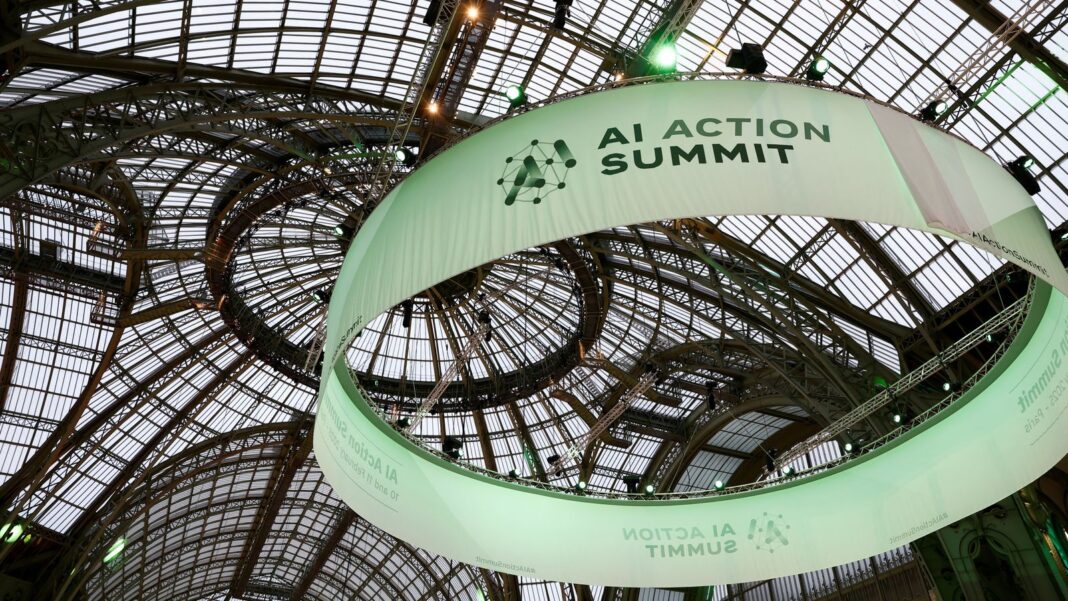Heads of state and tech bosses are gathering, with some trying to break US and Chinese dominance in artificial intelligence.
Top government officials and scientists from around 100 countries are gathering in Paris for the AI Action Summit, which will discuss the future of artificial intelligence.
Co-hosted by India’s Narendra Modi, the summit’s guests also include US vice president JD Vance, Canada’s Prime Minister Justin Trudeau and China’s deputy leader Zhang Guoqing.
It’s Mr Vance’s first overseas trip in his new position, but many of the summit’s attendees, including Mr Modi, are hoping to break his country’s dominance in artificial intelligence.

JD Vance and his children arrive at Paris Orly Airport. Pic: Reuters
The ten biggest AI companies in the world are based in the US including Apple, Nvidia, Microsoft, Oracle, Meta and Alphabet.
A fortnight ago, Chinese company DeepSeek also threw the industry into chaos when it revealed an AI model more powerful than ChatGPT and made for a fraction of the cost, showing just how powerful China could be in the industry.
Mr Modi has said he intends to bring a wider range of people into AI development and prevent the sector from becoming a US-China battle.
His foreign secretary Vikram Misri also stressed the need for equitable access to AI to avoid “perpetuating a digital divide that is already existing across the world”.
Analysis:
Paris summit shows dangers of AI race

Emmanuel Macron and Chinese Vice Premier Zhang Guoqing during their meeting at Elysee Palace in Paris. Pic: Reuters
Innovation, regulation and the challenges of embracing AI
However, breaking US dominance may be easier said than done, especially for countries with stricter AI regulation.
President Trump has already torn up rules imposed by Joe Biden, saying they “hinder[ed] AI innovation and impose[d] onerous and unnecessary government control over the development of AI”.
That’s a sentiment echoed by big tech bosses.
“If we want growth, jobs and progress, we must allow innovators to innovate, builders to build and developers to develop,” Sam Altman, chief executive of OpenAI, wrote in Le Monde ahead of the summit.
“There’s a lot of complicated questions to resolve” around issues like the ability to control AI systems, said Sir Demis Hassabis, founder of Google DeepMind, at the summit.
“But also I think even more complicated are maybe the geopolitical questions about things like regulation.”

Sir Demis Hassabis, co-founder and CEO of Google DeepMind, attends the summit in Paris. Pic: Reuters
Companies in EU countries, for example, may find it harder to innovate than those in the US or China after the EU introduced the AI Safety Bill last year, which imposes strict restrictions on how AI can be used in the region.
The UK also has guidelines around how AI can be used, but in January, Sir Keir Starmer promised to “mainline AI into the veins” of the country, saying AI could bring £47bn to the economy every year.
As well as politicians, the tech world’s elite are in the French capital, with Mr Altman, Microsoft president Brad Smith and Google chief executive Sundar Pichai among the big names attending.

Participants attend the AI Action Summit in Paris. Pic: Reuters
What keeps AI experts awake at night
Yoshua Bengio, known as one of the “godfathers of AI”, will also speak at the event.
The scientist recently said he is “kept awake at night” by the fear that humans may build systems “smarter than us that we don’t know how to control”.
Protecting people from unregulated AI is one of the topics up for discussion at the conference but a leaked draft of the document that will be signed by attending countries tomorrow doesn’t appear to mention mitigating AI’s risks.
Read more:
UK to ‘lose AI leadership’ without data strategy
How to protect your privacy from AI
Please use Chrome browser for a more accessible video player

0:45
Yoshua Bengio warns of AI’s dangers
One attendee, MIT professor Max Tegmark who is the president of the Future of Life Institute, urged countries not to sign the document.
“To reap unimaginable benefits without endangering millions of livelihoods and lives, AI needs binding safety standards – like we have for every other industry,” he said in a statement to Sky News.
“This is supported by history, science, public opinion and common-sense. This critical moment calls for courageous leaders who take action – not ones who bury their heads in the sand to appease Big Tech.
“Countries should not sign it.”







